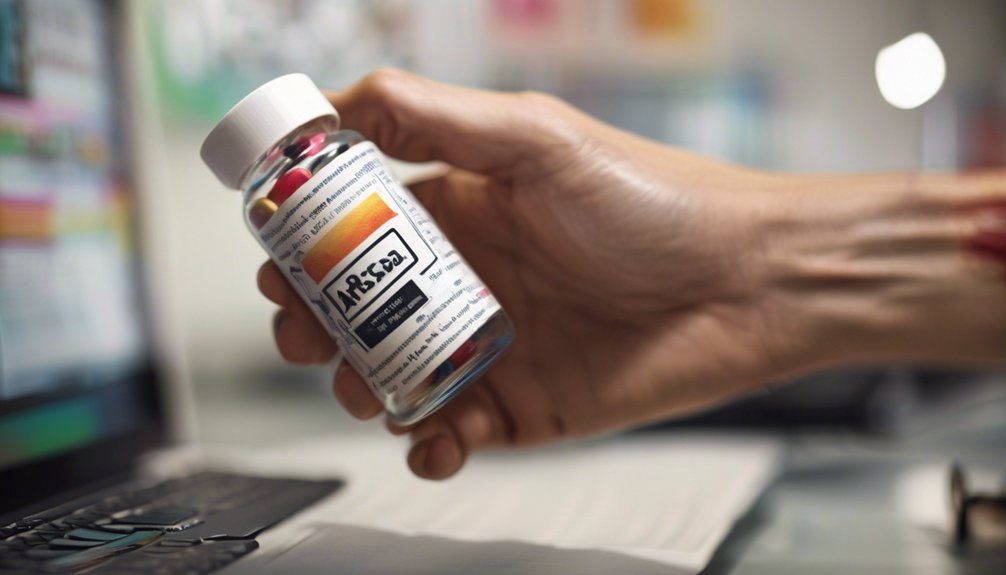Did you know that repurposed drugs can be effective treatments for conditions beyond their original intent? This opens the door for innovative therapies, but it also raises questions about how these drugs are marketed in health media. Ethical considerations play a crucial role in ensuring that consumers receive accurate information. What are the implications of these marketing practices for patient trust and safety? The answers may surprise you.
Key Takeaways
- Ethical marketing of repurposed drugs emphasizes transparency and honesty to build consumer trust and facilitate informed decision-making.
- Adherence to regulatory guidelines ensures that marketing practices protect consumers while providing accurate information about repurposed drugs.
- Patient education is crucial; clear communication of benefits and risks enhances understanding and acceptance of repurposed medications.
- Engaging healthcare professionals in discussions about repurposed drugs fosters a responsible dialogue and encourages community support.
- Utilizing data-driven insights allows for targeted marketing strategies that respect patient preferences and enhance ethical communication efforts.
Understanding Repurposed Drugs and Their Benefits

While many people may not realize it, repurposed drugs have emerged as a promising solution in the pharmaceutical landscape, offering new hope for various medical conditions.
By taking existing medications and applying them to new therapeutic uses, researchers can expedite the drug development process, significantly benefiting patients. This approach not only reduces the time and cost associated with bringing new treatments to market but also provides access to effective therapies for conditions that previously lacked options.
Patient benefits from repurposed drugs include quicker relief, fewer side effects, and improved quality of life. Additionally, leveraging established safety profiles allows for a more confident prescription.
The Role of Health Media in Drug Marketing
The increasing prevalence of repurposed drugs has prompted a shift in how health media approaches drug marketing. As you navigate this evolving landscape, it’s crucial to understand the role of digital health in disseminating accurate information.
Health media platforms must balance the promotion of repurposed drugs with the regulatory challenges that come from advertising pharmaceutical products. By prioritizing transparency and evidence-based information, these platforms can foster trust among patients and healthcare providers.
You’ll find that ethical marketing practices not only enhance public awareness but also ensure that patients receive the right information to make informed decisions. Ultimately, the responsibility lies with health media to create a responsible dialogue that serves the community while adhering to necessary regulations.
Ethical Guidelines for Pharmaceutical Advertising
As pharmaceutical companies navigate the complexities of advertising repurposed drugs, adhering to ethical guidelines becomes essential for maintaining public trust. You should prioritize advertising standards that reflect transparency and honesty.
Regulatory compliance isn’t just a legal obligation; it’s a commitment to consumer protection. By employing ethical frameworks, you can ensure that marketing strategies align with principles of pharmaceutical ethics and prioritize patient welfare.
This fosters marketing integrity, allowing you to build credibility within the healthcare community. Remember, your messaging should focus on accurate information, avoiding misleading claims or exaggerations.
Ultimately, ethical advertising not only safeguards consumers but also enhances the industry’s reputation, encouraging a more responsible approach to drug promotion.
Balancing Innovation and Patient Safety

When considering the balance between innovation and patient safety, it’s crucial to recognize how swiftly the pharmaceutical landscape evolves. You’ll find that patient perceptions greatly influence the acceptance of repurposed drugs.
While these innovations can offer new treatment options, they often come with safety concerns that can’t be overlooked. Navigating innovation trade-offs is essential; you need to weigh the benefits against potential risks.
Additionally, regulatory challenges can complicate this process, as they strive to ensure safety without stifling innovation. Engaging with stakeholders, including patients and healthcare providers, helps address these issues.
Transparency in Communication: A Necessity
While navigating the complex world of pharmaceutical marketing, you’ll find that transparency in communication is not just beneficial—it’s essential. Effective communication strategies build trust with consumers and enhance their awareness about repurposed drugs. When patients understand the benefits and risks, they’re empowered to make informed choices.
| Communication Strategy | Importance |
|---|---|
| Clear Messaging | Reduces misinformation |
| Open Dialogue | Encourages patient questions |
| Consistent Updates | Keeps consumers informed |
| Feedback Mechanisms | Establishes trust |
Case Studies: Successful and Ethical Promotions
Successful and ethical marketing of repurposed drugs hinges on real-world examples that showcase effective strategies.
Case studies like the promotion of sildenafil for pulmonary hypertension illustrate how companies can ethically market repurposed drugs. By focusing on scientific research and transparent communication, these companies address ethical considerations while providing valuable treatments.
Another notable example is the use of metformin beyond diabetes management, where campaigns highlight its benefits for polycystic ovary syndrome.
In both cases, the emphasis on evidence-based results and patient education fosters trust.
These case studies reveal that when ethical considerations guide marketing efforts, you not only enhance public understanding but also improve health outcomes, demonstrating the potential of repurposed drugs in serving communities effectively.
The Impact of Misleading Claims on Public Trust

Misleading claims in the marketing of repurposed drugs can significantly erode public trust, leading to skepticism about pharmaceutical companies and their motives. When consumers encounter misleading advertisements, they often question the integrity of the entire industry. This trust erosion results in credibility loss not just for individual companies but for the sector as a whole.
| Misleading Claims | Impact on Trust | Solutions |
|---|---|---|
| False efficacy claims | Public skepticism | Marketing ethics training |
| Omitted side effects | Trust erosion | Clear consumer awareness |
| Exaggerated benefits | Reputation damage | Transparent communication |
| Misleading testimonials | Misinformation impact | Ethics in advertising |
| Conflicting information | Loss of credibility | Regulatory oversight |
Restoring trust requires a commitment to ethical marketing practices that prioritize consumer well-being.
Strategies for Educating Patients About Repurposed Drugs
As the landscape of medicine evolves, understanding repurposed drugs becomes crucial for patients seeking effective treatments.
To enhance patient education and ensure informed consent, consider these strategies:
Enhancing patient education and informed consent is vital for understanding repurposed drugs and their potential benefits.
- Transparent Communication: Share clear information about the benefits and risks of repurposed drugs, focusing on evidence-based research.
- Visual Aids: Use infographics and videos to help patients easily grasp complex concepts related to these medications.
- Patient Testimonials: Highlight real-life experiences from individuals who’ve benefited from repurposed drugs to build trust and relatability.
- Interactive Workshops: Organize sessions where healthcare professionals can answer questions, fostering an open dialogue about medication options.
Future Trends in Ethical Marketing Practices
While the marketing landscape for pharmaceuticals is rapidly changing, ethical practices are becoming increasingly vital for ensuring patient trust and safety. Future trends in ethical marketing will likely focus on sustainable practices and the integration of digital marketing strategies. You’ll see a shift towards transparency in communications, fostering a sense of community and support around health decisions.
| Trend | Description |
|---|---|
| Enhanced Transparency | Clearer communication about drug benefits and risks. |
| Community Engagement | Building online support networks for patients. |
| Data-Driven Insights | Utilizing analytics to tailor ethical messages. |
| Eco-friendly Packaging | Commitment to sustainability in product presentation. |
| Personalized Marketing | Customizing messages to meet individual patient needs. |
Frequently Asked Questions
What Are the Potential Risks of Repurposed Drugs?
When considering repurposed drugs, you should be aware of safety concerns like unexpected side effects and regulatory challenges that may arise, potentially impacting their effectiveness and approval processes. Always prioritize thorough research and patient safety.
How Can Patients Verify Drug Claims in Health Media?
To verify drug claims, you should prioritize patient education. Investigate reputable sources, consult healthcare professionals, and cross-check information. Claim verification ensures you make informed decisions, protecting your health and empowering others in their treatment journeys.
Are Repurposed Drugs Covered by Insurance?
You’ll find that insurance coverage for repurposed drugs varies widely. Some plans may cover them, enhancing drug accessibility, while others might not. Always check with your provider to understand your specific coverage options and limitations.
What Role Do Healthcare Professionals Play in Drug Marketing?
You’ll find healthcare professionals crucial in drug marketing; they educate patients while navigating ethical considerations. Their insights help ensure accurate information reaches patients, fostering trust and informed decisions about medication options and potential treatments.
How Do Repurposed Drugs Affect Treatment Costs for Patients?
Imagine cutting your medical bills in half—repurposed drugs often do just that. Through cost effectiveness analysis, they enhance patient affordability, making treatments more accessible while ensuring quality care. It’s a win-win for both health and wallet.
Conclusion
In a world where misinformation spreads faster than facts, ethical marketing of repurposed drugs might seem like a quaint notion. Yet, by prioritizing transparency and patient education, pharmaceutical companies can turn this irony on its head. Instead of fostering doubt, they can build trust through clear communication and evidence-based information. By doing so, they not only protect patient safety but also pave the way for a healthier future—ironically, the very outcome every marketer claims to champion.




